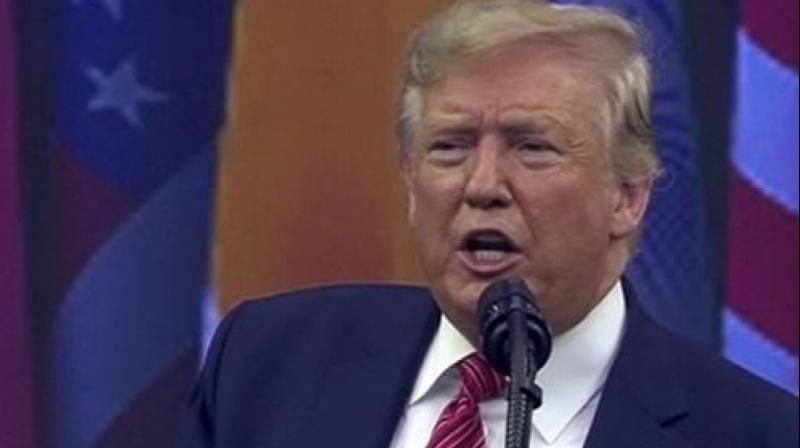\'I never rule anything out,\' says Trump on meeting Rouhani as speculation swirls
Macron said if Trump became convinced he could get something from meeting with Rouhani, he could decide to go ahead at very short notice.

United Nations: US President Donald Trump said Monday he could not rule out a meeting with Iranian counterpart Hassan Rouhani at the United Nations this week, but no encounter was yet scheduled.
Speculation has been rife over whether the leaders of the two arch-foes would finally meet on the sidelines of the UN General Assembly in New York, with France's Emmanuel Macron trying to broker what would be a historic rendezvous.
The chances of this happening have seemingly diminished in the wake of a dramatic attack on Saudi oil facilities blamed by the United States on Iran, which denies being involved. "I never rule anything out," Trump told reporters, but added that he had "nothing scheduled at this moment."
Macron is cautiously hopeful for a breakthrough and is seeking to bring the two together, having consulted informally with Trump on Monday, then meeting for more than 90 minutes with Rouhani that evening.
"The path of de-escalation is narrow but more necessary than ever, and it was time for Iran to take it," Macron told Rouhani in the meeting, according to a statement from the French presidency. Macron plans to meet with the US president again on Tuesday, and told reporters earlier on Monday, "I'll do everything I can so that conditions are created for discussion."
However Trump responded to his efforts by saying "we don't need a mediator." The Iranians "know whom to call," he said. Tehran and Washington have been at loggerheads since May last year when Trump abandoned a 2015 nuclear deal and began reimposing sanctions on Iran in a campaign of "maximum pressure."
Following the Group of Seven summit in France in August, though, Trump spoke openly of his willingness to meet his Iranian counterpart face-to-face, if the conditions were right. Trump is fond of the optics of high-profile meetings -- his summits with North Korea's Kim Jong Un are testament to that -- and a summit would mark a diplomatic coup a year ahead of his re-election bid. He tempered his enthusiasm, though, after the devastating September 14 attacks on Saudi oil installations that Washington and Riyadh have, to varying degrees, blamed on Tehran.
The attacks heightened tensions and renewed fears of a military escalation in the region. "Did the chances of a meeting increase with these strikes? No, we have to be clear, we can see that things are getting tense," Macron said Sunday en route to New York.
"The two main players are there," he added, referring to Rouhani and Trump. "Something can happen." Diplomats hope a meeting would help de-escalate tensions in the Gulf that have flared since May when the United States ended all waivers in its unilateral sanctions that seek to stop Iran from selling any oil.
Iran has responded by reducing its commitments under the nuclear deal and Trump has deployed military assets to the region. The door to talks appears open, though. US Secretary of State Mike Pompeo, viewed as a hawk on Iran, has spoken of the need to give diplomacy "every opportunity to succeed" in the wake of the Saudi attacks. There are signs of goodwill on the Iranian side, too.
On the eve of the General Assembly, Iran said a British-flagged oil tanker seized in the Gulf two months ago was free to leave. Iranian Foreign Minister Mohammad Javad Zarif, who met his French counterpart late Sunday, said that "we are not closing the door for conversation."
"What we're saying is that you need to establish credibility," he told reporters at the United Nations, warning against any meeting becoming simply "a photo opportunity" for Trump. Macron met German Chancellor Angela Merkel and British Prime Minister Boris Johnson on Monday afternoon where they agreed with the US that Iran was responsible for the blasts at the Abqaiq and Khurais facilities.
"There is no other plausible explanation," the leaders said in a joint statement. But the three European countries, which remain part of the nuclear deal negotiated under former US president Barack Obama and are trying to salvage it -- said the solution was diplomacy. "We urge Iran to engage in such a dialogue and refrain from further provocation and escalation," they said.
Macron said that if Trump became convinced he could get something from a meeting with Rouhani, he could decide to go ahead at very short notice. A senior US official said no meeting was planned at this stage, even between lower level officials.
Catch the latest news, live coverage and in-depth analyses from India and World. Follow us on Facebook and Twitter.

